The primary function of the Public Education Office (PEO) is to provide public education and promote public participation in the processes and activities of Parliament. The provision of information and education is fundamental to enabling citizens to participate from an informed perspective in the processes of Parliament. The roles and functions of PEO are derived from the constitutional obligation imposed on Parliament to facilitate public involvement in the legislative and other processes of Parliament
Our Objectives
- provide improved and more regular information to citizens,
- ensure more meaningful engagement with communities,
- provide regular public education on issues of national importance, and
- increase public access and participation in its processes to strengthen participatory democracy.
Our Services
- Stakeholder Engagement
- Educational Content Development
- Educational Programme Development
- Educational Programme Implementation
- Educational tours of Parliament
Medium Term Budget Policy Statement
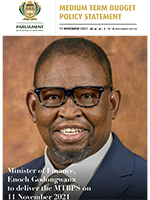 Minister of Finance, Enoch Godongwana delivered the MTBPS on 11 November 2021
Minister of Finance, Enoch Godongwana delivered the MTBPS on 11 November 2021
English
16 Days of Activism Calendar
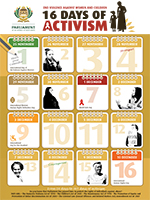 End Violence Against Women and Children
End Violence Against Women and Children
English
Section 25 of the Constitution Eighteenth Amendment Bill
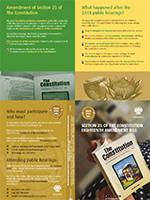 The Joint Constitutional Review Committee (Joint CRC) conducted public hearings in all the provinces of South Africa in 2018. The sole purpose of these extensive public engagements was to solicit public inputs on the Amendment of Section 25 of the Constitution.
The Joint Constitutional Review Committee (Joint CRC) conducted public hearings in all the provinces of South Africa in 2018. The sole purpose of these extensive public engagements was to solicit public inputs on the Amendment of Section 25 of the Constitution.
English
| Afrikaans
| isiXhosa
| isiZulu
| isiNdebele
| Sepedi
| Sesotho
| Setswana
| siSwati
| Tshivenda
| Xitsonga
The National Health Insurance (NHI) Bill
Fast Facts – Women’s Charter
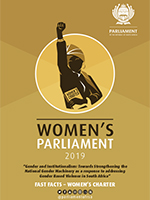 “Gender and Institutionalism: Towards Strengthening the National Gender Machinery as a response to addressing Gender Based Violence in South Africa”
“Gender and Institutionalism: Towards Strengthening the National Gender Machinery as a response to addressing Gender Based Violence in South Africa”
English
The State of the Nation Address
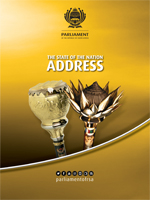 The State of the Nation Address is one of the most important annual events in the calendar of Parliament.
The State of the Nation Address is one of the most important annual events in the calendar of Parliament.
English
The Guide to Budget
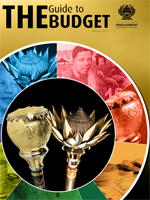 February is known as Budget Month, when the citizens of South Africa and Parliament are informed of the state of the country’s economy and what government expenditure to expect in the various departments.
February is known as Budget Month, when the citizens of South Africa and Parliament are informed of the state of the country’s economy and what government expenditure to expect in the various departments.
English
The Fourth Industrial Revolution
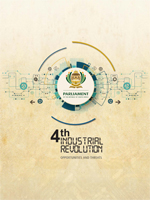 The Fourth Industrial Revolution, or 4th IR, is the fourth major industrial era since the initial Industrial Revolution of the 18th century. The term was coined by Klaus Schwab, founder and executive chairman of the World Economic Forum to describe a world where individuals move between digital domains and offline reality with the use of connected technology to enable and manage their lives.
The Fourth Industrial Revolution, or 4th IR, is the fourth major industrial era since the initial Industrial Revolution of the 18th century. The term was coined by Klaus Schwab, founder and executive chairman of the World Economic Forum to describe a world where individuals move between digital domains and offline reality with the use of connected technology to enable and manage their lives.
English
16 Days of Activism
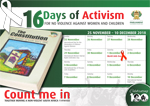 16 Days of Activism for No Violence Against Women and Children
16 Days of Activism for No Violence Against Women and Children
English
You and the Constitution
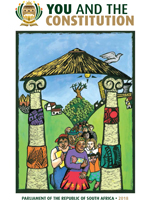 All other laws in the country must be in line with the Constitution.The Constitution does not replace other laws. It sets out the standards which laws must follow. It serves as the foundation of a house. The walls, windows, doors and roof of the house are other laws.
All other laws in the country must be in line with the Constitution.The Constitution does not replace other laws. It sets out the standards which laws must follow. It serves as the foundation of a house. The walls, windows, doors and roof of the house are other laws.
English
Constitutional Review Committee Pamphlet
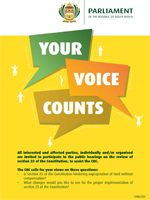 Section 25 of the Constitution is popularly known as the property clause in the Constitution. The said clause provides the neccessary steps to be followed when the State decides to expropriate property from individuals or companies for public interest.
English
| Afrikaans
| isiXhosa
| isiZulu
| isiNdebele
| Sepedi
| Sesotho
| Setswana
| siSwati
| Tshivenda
| Xitsonga
Section 25 of the Constitution is popularly known as the property clause in the Constitution. The said clause provides the neccessary steps to be followed when the State decides to expropriate property from individuals or companies for public interest.
English
| Afrikaans
| isiXhosa
| isiZulu
| isiNdebele
| Sepedi
| Sesotho
| Setswana
| siSwati
| Tshivenda
| Xitsonga
Constitutional Review Committee Flyer
Africa Day Pamphlet 2018
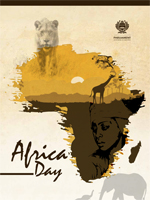 Africa Day is the annual commemoration of the foundation of the Organisation of African Unity (OAU) on May 25, 1963. On this historic day, thirty-two (32) African countries met in Addis Ababa, Ethiopia to form the organisation. Today, Africa Day is celebrated in various countries on the African continent, as well as around the world.
Africa Day is the annual commemoration of the foundation of the Organisation of African Unity (OAU) on May 25, 1963. On this historic day, thirty-two (32) African countries met in Addis Ababa, Ethiopia to form the organisation. Today, Africa Day is celebrated in various countries on the African continent, as well as around the world.
English
| Afrikaans
| isiXhosa
| isiZulu
| isiNdebele
| Sepedi
| Sesotho
| Setswana
| siSwati
| Tshivenda
| Xitsonga
Youth Month 2017
English | Afrikaans | isiXhosa | isiZulu | isiNdebele | Sepedi | Sesotho | Setswana | siSwati | Tshivenda | Xitsonga
Africa Day Poster
Human Rights
As the name suggests, human rights are rights that everyone must enjoy, by the mere fact that they are human beings. These rights are inalienable, which means that it cannot be taken away from you except in specific situations and according to due process.
Click Here
Guide to the Budget
It is impossible to say when the Budget process begins or ends, or even how individual financial years can be separated from each other. Tracking the Budget is an ongoing process.
Click Here
State of the Nation Address 2016
What is the State of the Nation Address? It is an annual address to the nation by the President of the Republic of South Africa as the Head of State. It is delivered at a joint sitting of Parliament – customarily at the beginning of an annual session.
Click Here
How the Budget works and Oversight
WHAT IS A BUDGET? A budget is a written document clearly showing how much income is received (coming in) and how (and on what) it will be spent within a given period of time. The main purpose of a budget is to ensure that the unlimited needs are prioritised in order of importance. This allows one to plan expenditure in such a way that priority areas (such as housing, education and healthcare) can be met.
Click Here
The National Budget
We, the People...
Believe that South Africa belongs to those who live in it, united in diversity...
What Are Human Rights?
How a Law is Made
How the Budget Works for Us
State of the Nation Address 2015
Parliament Gives The Green Light...
English | Afrikaans | isiXhosa | isiZulu | isiNdebele | Sepedi | Sesotho | Setswana | siSwati | Tshivenda | Xitsonga
Youth Month
Youth and Parliament
English | Afrikaans | isiXhosa | isiZulu | isiNdebele | Sepedi | Sesotho | Setswana | siSwati | Tshivenda | Xitsonga
Africa Day - 25 May 2011
English | Afrikaans | isiXhosa | isiZulu | isiNdebele | Sepedi | Sesotho | Setswana | siSwati | Tshivenda | Xitsonga
State of the Nation Address 2011
English | Afrikaans | isiXhosa | isiZulu | isiNdebele | Sepedi | Sesotho | Setswana | siSwati | Tshivenda | Xitsonga
Spotlight on Parliament
Since the advent of democracy in 1994 it has become possible for all citizens to get involved in what is happening in Parliament ...
 Getting involved in Parliament
Getting involved in Parliament Your representatives in Parliament
Your representatives in Parliament How our democracy works
How our democracy works Why the Constitution is so important
Why the Constitution is so important The work of Parliament
The work of Parliament The National Assembly
The National Assembly The National Council of Provinces (NCOP)
The National Council of Provinces (NCOP) How a law is made
How a law is made Parliament and the Budget
Parliament and the Budget Committees in Parliament
Committees in Parliament
Factsheets on Parliament
Our democracy in South Africa is very new. People struggled for a very long time for democracy in our country. Find some factsheets on Parliament here ...
Click Here
A Day in Parliament
An educational cartoon depicting life in Parliament ...
Click Here
State of the Nation Address 2010
The State of the Nation Address is the annual occasion when the President of the Republic of South Africa addresses Parliament and the Nation.
Click here
The National Council of Provinces
English | Afrikaans | isiXhosa | isiZulu | isiNdebele | Sepedi | Sesotho | Setswana | siSwati | Tshivenda | Xitsonga
Committees of Parliament
English | Afrikaans | isiXhosa | isiZulu | isiNdebele | Sepedi | Sesotho | Setswana | siSwati | Tshivenda | Xitsonga
Submissions to Parliament
English | Afrikaans | isiXhosa | isiZulu | isiNdebele | Sepedi | Sesotho | Setswana | siSwati | Tshivenda | Xitsonga
Women and Parliament
English | Afrikaans | isiXhosa | isiZulu | isiNdebele | Sepedi | Sesotho | Setswana | siSwati | Tshivenda | Xitsonga
Parliament and Oversight
English | Afrikaans | isiXhosa | isiZulu | isiNdebele | Sepedi | Sesotho | Setswana | siSwati | Tshivenda | Xitsonga
Petitions to Parliament
English | Afrikaans | isiXhosa | isiZulu | isiNdebele | Sepedi | Sesotho | Setswana | siSwati | Tshivenda | Xitsonga

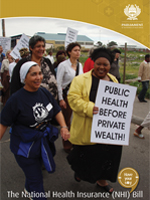 Parliament of South Africa is inviting inputs from the public on the National Health.
Parliament of South Africa is inviting inputs from the public on the National Health.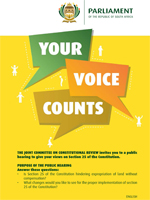 The Joint Committee on constitutional review invites you to a public hearing to give your views on section 25 of the constitution.
The Joint Committee on constitutional review invites you to a public hearing to give your views on section 25 of the constitution.